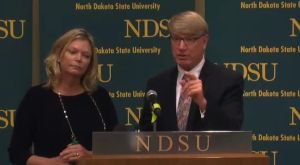University system seeks broad exemption from open records law

By Rob Port | Watchdog.org North Dakota Bureau
BISMARCK, N.D. — North Dakota University System officials say they want an exemption from open records request only for draft versions of evaluations for university presidents, but legislation pre-filed by the system indicates a much broader request.
CLOSED RECORDS: North Dakota University System officials, including State Board of Higher Education President Kirsten Diederich and Chancellor Larry Skogen, are backing legislation to institute a broad exemption from open records request for evaluations of university presidents.
At a Nov. 20 meeting of the State Board of Higher Education, Interim Chancellor Larry Skogen announced the university system would be seeking an exemption from open records requests for evaluations of university presidents. In early December, University System spokeswoman Linda Donlin told the Fargo Forum the legislation would seek only to exempt draft versions of the evaluations. Final evaluations would be public.
“When we’re in draft form we were working with the language to make sure it said what we wanted it to say. … As we were working, getting the language down to what we wanted, it went through several versions to make sure the bill draft said what was originally intended,” NDUS Chief Counsel Murray Sagsveen told the Forum.
But a copy of the legislation, pre-filed in Bismarck for the upcoming legislative session and obtained by Watchdog.org through an open records request, shows a request for an exemption that is much broader than draft copies of evaluations.
“All records used by the board, university system employees, and consultants to prepare performance evaluations of the presidents and the commissioner are exempt,” the legislation reads.
Records used in past evaluations of the state’s university presidents include everything from student graduation rates to spending on building projects. The bill also would allow meetings pertaining to the selection of a new university system chancellor to be held in executive session, as well as any discussions of the president evaluations. Executive sessions are closed to the public.
The motivations for the proposed law may have its roots in the tumultuous tenure of a former chancellor.
Skogen’s predecessor, Hamid Shirvani, was asked by the State Board of Higher Education to produce evaluations of the university presidents during his last months in office in 2013. Some of those evaluations were scathing, and requested full job performance reviews.
When the university presidents complained to the SBHE, going so far as to suggest that the publication of the evaluations was illegal, Shirvani was placed on leave and Skogen was appointed to replace him.
One of Skogen’s first actions was to throw out Shirvani’s negative evaluations and replace them with more positive evaluations. Months later, Skogen canceled the performance reviews of the presidents. Now SBHE members claim that evaluations of the university presidents can’t be done without an exemption from open records requests.







